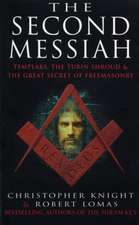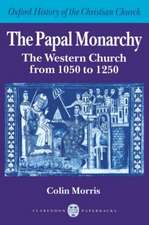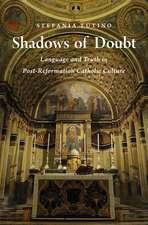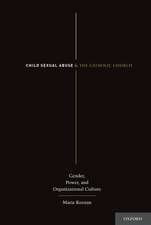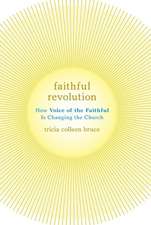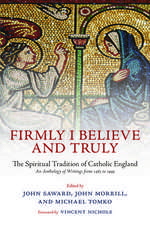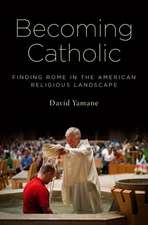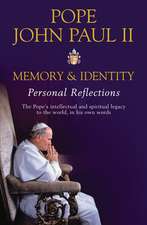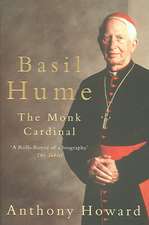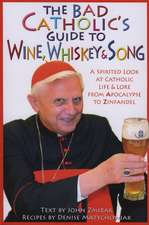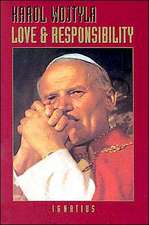A History of the Popes 1830-1914: Oxford History of the Christian Church
Autor Owen Chadwicken Limba Engleză Hardback – 16 apr 1998
| Toate formatele și edițiile | Preț | Express |
|---|---|---|
| Paperback (1) | 397.19 lei 31-37 zile | |
| OUP OXFORD – 20 mar 2003 | 397.19 lei 31-37 zile | |
| Hardback (1) | 1454.82 lei 31-37 zile | |
| Clarendon Press – 16 apr 1998 | 1454.82 lei 31-37 zile |
Din seria Oxford History of the Christian Church
- 27%
 Preț: 397.19 lei
Preț: 397.19 lei - 34%
 Preț: 538.28 lei
Preț: 538.28 lei - 34%
 Preț: 1233.78 lei
Preț: 1233.78 lei - 29%
 Preț: 1476.53 lei
Preț: 1476.53 lei - 18%
 Preț: 607.74 lei
Preț: 607.74 lei - 27%
 Preț: 426.47 lei
Preț: 426.47 lei - 34%
 Preț: 1133.56 lei
Preț: 1133.56 lei -
 Preț: 360.60 lei
Preț: 360.60 lei - 25%
 Preț: 538.28 lei
Preț: 538.28 lei - 34%
 Preț: 1015.50 lei
Preț: 1015.50 lei - 34%
 Preț: 899.02 lei
Preț: 899.02 lei - 27%
 Preț: 410.10 lei
Preț: 410.10 lei - 34%
 Preț: 1762.36 lei
Preț: 1762.36 lei - 22%
 Preț: 425.12 lei
Preț: 425.12 lei - 34%
 Preț: 2528.84 lei
Preț: 2528.84 lei - 33%
 Preț: 653.47 lei
Preț: 653.47 lei - 7%
 Preț: 338.81 lei
Preț: 338.81 lei - 20%
 Preț: 235.75 lei
Preț: 235.75 lei - 11%
 Preț: 304.36 lei
Preț: 304.36 lei
Preț: 1454.82 lei
Preț vechi: 2208.47 lei
-34% Nou
Puncte Express: 2182
Preț estimativ în valută:
278.37€ • 291.43$ • 230.34£
278.37€ • 291.43$ • 230.34£
Carte tipărită la comandă
Livrare economică 25-31 martie
Preluare comenzi: 021 569.72.76
Specificații
ISBN-13: 9780198269229
ISBN-10: 0198269226
Pagini: 624
Dimensiuni: 164 x 243 x 37 mm
Greutate: 1.01 kg
Ediția:New.
Editura: Clarendon Press
Colecția Clarendon Press
Seria Oxford History of the Christian Church
Locul publicării:Oxford, United Kingdom
ISBN-10: 0198269226
Pagini: 624
Dimensiuni: 164 x 243 x 37 mm
Greutate: 1.01 kg
Ediția:New.
Editura: Clarendon Press
Colecția Clarendon Press
Seria Oxford History of the Christian Church
Locul publicării:Oxford, United Kingdom
Recenzii
Professor Chadwick writes with a sensitive empathy with the Roman Catholic mind. A well-organised index and a copious descriptive bibliography complete this magesterial and entertaining monograph.
Chadwick's informative study is written, as one would expect, with wit and with a sinewy elegance. Part of his secret is his ability to blend material culled from primary and secondary sources with entertaining and revealing case studies and anecdotes.
The four pontificates are treated in such breadth that we have what comes to a history of eight-and-a-half decades of Roman Catholicism ... Chadwick depicts the four pontiffs vividly.
compelling and compendious study
the chief merit of this volume is Chadwick's balance in treating and assessing the issues in a series of dramatic confrontations and the character, strengths, and limitations of the popes and many of the other protagonists.
quintessential Chadwick: history well researched, attentive to primary sources, covering a wide range of literature, even Italian. He contextualizes the creeping, even galloping centralism that has become characteristic of modern papal governance. Despite his principal preoccupations with church-state issues, he also analyzes properly theological themes.
a magisterial study. Even what is modestly described as a 'select bibliography' is outstanding.
Chadwick provides a scholarly but sympathetic picture of the popes who had confronted the problems of secularization, the impositions of nationalism and liberalism, and the loss of the temporal power.
fair and objective in his assessment of both theological and political issues ... Possessing vast knowledge of the facts, an unerring eye for significant detail, a ready wit, and a facile style, Chadwick reveals a mastery of the Latin, Italian, French, German, English, and Spanish sources, which are listed in the biography.
A new volume in the Oxford History of the Christian Church, of which the brothers Chadwick are the editors, must be noteworthy, and this one is much to be welcomed ... Professor Chadwick is a prose artist and the book is often delightful to read ... This one is something of a jewel in an already distinguished series; an interpretive study which, even if only the brightest undergraduates will get the best out of it, other scholars cannot but find stimulating and provocative.
is the most detailed English work to date in this field ... it provides essential background for anyone who wishes to understand the significant political and spiritual contributions made by the papacy in the twentieth century ... This book should remain a standard in the field of papal studies for years to come.
wonderful book ... Chadwick's heart is clearly with Pius IX and the account here given of him and his long pontificate of 32 years could be claimed as definitive ... there are twelve fascinating pages on Benedictine history ... It is beautifully written in the best Chadwickian style.
Chadwick brings to his narrative a magisterial knowledge of the literature in every major European language, an unerring instinct for the telling detail that reveals more than pages of analysis, a broad and non-judgemental human sympathy ... Marvellous on the Churches and bishops of France and Germany, fascinating on tensions in Russia and Poland ... the whole book is full of compassion and insight, the mature product of a great and wise historian.
A sympathetic introduction to four popes and their interaction with religion and politics on the mainland in a period of decisive transitions ... Owen Chadwick would have made a wise cardinal and perhaps even a nice pope. His cogent analysis of the electoral process would seem to suggest that we keen an eye out for a retiring Italian diplomat who likes to stay at home, his windows slightly ajar.
Chadwick is always informative, and writes with a sympathetic understanding, even of Pius IX and the Syllabus of Errors, which many a professedly Roman Catholic historian might find it difficult to emulate ... Reading through this text, one cannot but be impressed by the immense range of Professor Chadwick's reading and his knowledge.
Chadwick's informative study is written, as one would expect, with wit and with a sinewy elegance. Part of his secret is his ability to blend material culled from primary and secondary sources with entertaining and revealing case studies and anecdotes.
The four pontificates are treated in such breadth that we have what comes to a history of eight-and-a-half decades of Roman Catholicism ... Chadwick depicts the four pontiffs vividly.
compelling and compendious study
the chief merit of this volume is Chadwick's balance in treating and assessing the issues in a series of dramatic confrontations and the character, strengths, and limitations of the popes and many of the other protagonists.
quintessential Chadwick: history well researched, attentive to primary sources, covering a wide range of literature, even Italian. He contextualizes the creeping, even galloping centralism that has become characteristic of modern papal governance. Despite his principal preoccupations with church-state issues, he also analyzes properly theological themes.
a magisterial study. Even what is modestly described as a 'select bibliography' is outstanding.
Chadwick provides a scholarly but sympathetic picture of the popes who had confronted the problems of secularization, the impositions of nationalism and liberalism, and the loss of the temporal power.
fair and objective in his assessment of both theological and political issues ... Possessing vast knowledge of the facts, an unerring eye for significant detail, a ready wit, and a facile style, Chadwick reveals a mastery of the Latin, Italian, French, German, English, and Spanish sources, which are listed in the biography.
A new volume in the Oxford History of the Christian Church, of which the brothers Chadwick are the editors, must be noteworthy, and this one is much to be welcomed ... Professor Chadwick is a prose artist and the book is often delightful to read ... This one is something of a jewel in an already distinguished series; an interpretive study which, even if only the brightest undergraduates will get the best out of it, other scholars cannot but find stimulating and provocative.
is the most detailed English work to date in this field ... it provides essential background for anyone who wishes to understand the significant political and spiritual contributions made by the papacy in the twentieth century ... This book should remain a standard in the field of papal studies for years to come.
wonderful book ... Chadwick's heart is clearly with Pius IX and the account here given of him and his long pontificate of 32 years could be claimed as definitive ... there are twelve fascinating pages on Benedictine history ... It is beautifully written in the best Chadwickian style.
Chadwick brings to his narrative a magisterial knowledge of the literature in every major European language, an unerring instinct for the telling detail that reveals more than pages of analysis, a broad and non-judgemental human sympathy ... Marvellous on the Churches and bishops of France and Germany, fascinating on tensions in Russia and Poland ... the whole book is full of compassion and insight, the mature product of a great and wise historian.
A sympathetic introduction to four popes and their interaction with religion and politics on the mainland in a period of decisive transitions ... Owen Chadwick would have made a wise cardinal and perhaps even a nice pope. His cogent analysis of the electoral process would seem to suggest that we keen an eye out for a retiring Italian diplomat who likes to stay at home, his windows slightly ajar.
Chadwick is always informative, and writes with a sympathetic understanding, even of Pius IX and the Syllabus of Errors, which many a professedly Roman Catholic historian might find it difficult to emulate ... Reading through this text, one cannot but be impressed by the immense range of Professor Chadwick's reading and his knowledge.
Notă biografică
Major figure in academia.

